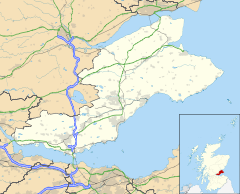Carnock
| Carnock | |
|---|---|
| Carnock shown within Fife | |
| OS grid reference | NT042890 |
| Council area | |
| Country | Scotland |
| Sovereign state | United Kingdom |
| Police | Scottish |
| Fire | Scottish |
| Ambulance | Scottish |
| EU Parliament | Scotland |
| UK Parliament | |
| Scottish Parliament | |
| Website | http://carnockgowkhall.wix.com/home# |
Carnock is a village and parish of Fife, Scotland, 4.2 miles (6.759km) west of Dunfermline. It is 1.3 miles (2.092km) east of Oakley, Fife. The village is said to be named for St. Cearnock, a disciple of St. Ninian. Alternatively the form may derive from Caer-cnoc, the meaning of "Caer" to be a fort or castle and "cnoc" which is known to mean an isolated hill (see History of Dunfermline). Carnock is known to have had military significance in antiquity.
The civil parish has a population of 5,927 (in 2011).
On the Main Street of Carnock lies a Parish church which was built in 1840, though in the nearby kirkyard lies the remains of the original 12th church which was rebuilt in 1602.
Nextdoor to the church is Carnock Primary School, this school serves both Carnock and Gowkhall. The school was built in 1864 with an extension added in 1912 and another in 2007. The main building consists of 4 classrooms and a medway hut used for various purposes.
Carnock Olympian:- Former pupil at Carnock Primary was Debbie Knox part of the Gold Medal winning team at the Winter Olympics in Curling at Salt Lake City. She did come back to the school to show her Medal to the pupils and crown the Gala Queen.
On Main Street is The Carnock Inn, inside there is restaurant and bar. Facilities are available for playing Pool or Darts. The pub is often used for parties or celebrations by schools or the locals. Next door to the Pub is a Vegetarian Bistro in what used to be the village Post Office . Now Oakley serves as the Post Office for Carnock.
The village also boasts a Community Centre built in 2005 and available for hire via Fife council.
In 1774 upon Carneil hill, near Carnock, several urns containing Roman coinage were discovered. It is believed that the local inhabitants, the Horestii, unsuccessfully defended this location against the Roman general Gnaeus Julius Agricola. The local names Easter Camps and Wester Camps are suspected to originate from this time. Another native fort is located at the nearby Craigluscar only 2 miles away. Subsequent Roman encampments are suspected 3 miles east of Dunfermline and a large camp at Loch Ore.
The Church in Carnock was held from 1592 to 1645 by the ecclesiastical historian John Row. Latterly the parish was overseen by Thomas Gillespie from 1741 to 1752. Thomas Gillespie was founder of the Relief Synod which was latterly incorporated into the United Presbyterian Church.
...
Wikipedia

